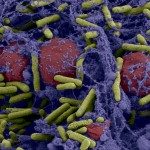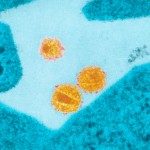Lien vers Pubmed [PMID] – 8021588
J. Gen. Virol. 1994 Jul;75 ( Pt 7):1569-78
We constructed two recombinant Autographa californica nuclear polyhedrosis baculoviruses. Spodoptera frugiperda (Sf9) cells containing these constructs produce carboxy-terminally truncated envelope E proteins representing dengue (DEN) virus serotypes 2 and 3. The two recombinant proteins contained their homologous signal sequences at the N terminus and were truncated by 71 and 74 amino acids at the C terminus, respectively. This allowed the translocation of the recombinant proteins to the endoplasmic reticulum followed by glycosylation processing and secretion into the extracellular medium. An additional unglycosylated form which was not secreted was detected inside the infected Sf9 cells. Sera from Swiss mice immunized with the infected Sf9 cell lysates gave a DEN cross-reactive response in ELISA and substantial amounts of neutralizing antibodies to the homologous virus. Similar antibody titres were obtained when the two recombinant proteins were inoculated concomitantly. BALB/c mice were vaccinated with three doses of the recombinant E proteins, taken as monovalent or bivalent immunogens, and challenged with mouse-adapted DEN-2 virus. DEN-2 E protein induced a good protection (90%) against lethal encephalitis and recombinant DEN-3 E protein gave a substantial cross-protection (54%). Eighty-two percent of the mice immunized with a mixture of both recombinant E proteins survived the DEN-2 virus challenge.

